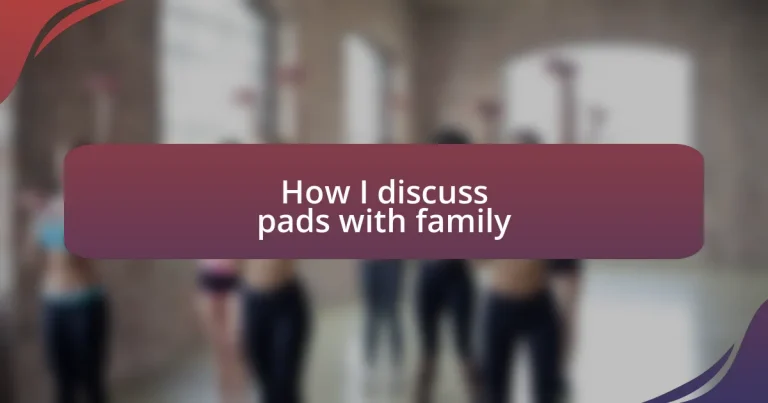Key takeaways:
- Pads are vital for menstrual health, providing both physical comfort and emotional support.
- Open conversations about pads can help break stigma, create understanding, and empower individuals.
- Respectful communication, active listening, and inclusive language are essential when discussing menstrual health with family.
- Sharing personal experiences and addressing misconceptions can foster a supportive dialogue and encourage openness.
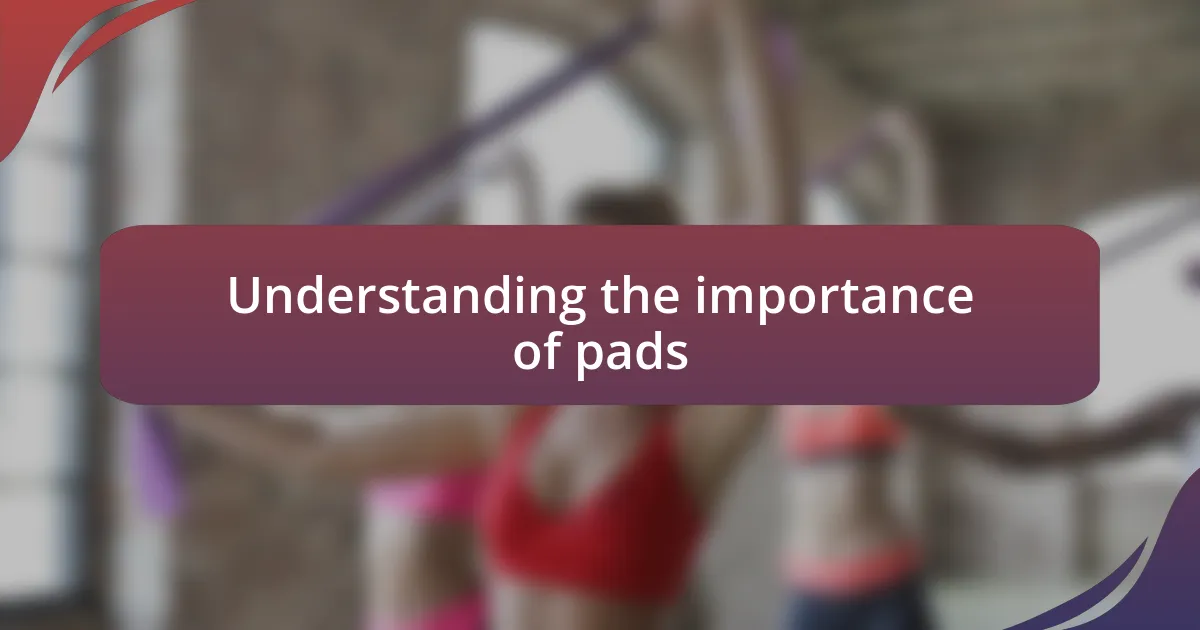
Understanding the importance of pads
Pads play a crucial role in menstrual health, providing comfort and safety during a time when many women feel vulnerable. I distinctly remember when my younger sister first got her period; as we talked about it, the relief on her face when I introduced her to pads was palpable. It’s one of those moments that underscores how essential these products are—not just for physical protection, but for emotional support as well.
When discussing the importance of pads, I often reflect on the freedom they offer. For instance, I can recall a camping trip where I was nervous about managing my period. Knowing I had reliable pads allowed me to enjoy the adventure without anxiety. Isn’t it fascinating how something so small can impact our confidence and daily choices during our menstrual cycle?
Moreover, pads promote a sense of dignity and normalcy. I’ve seen friends shy away from social events due to period worries, but when we talk openly about pads, it’s as if a weight lifts. Have you ever noticed how these discussions can transform embarrassment into empowerment? This shift can lead to a healthier relationship with our bodies and the natural processes we experience.
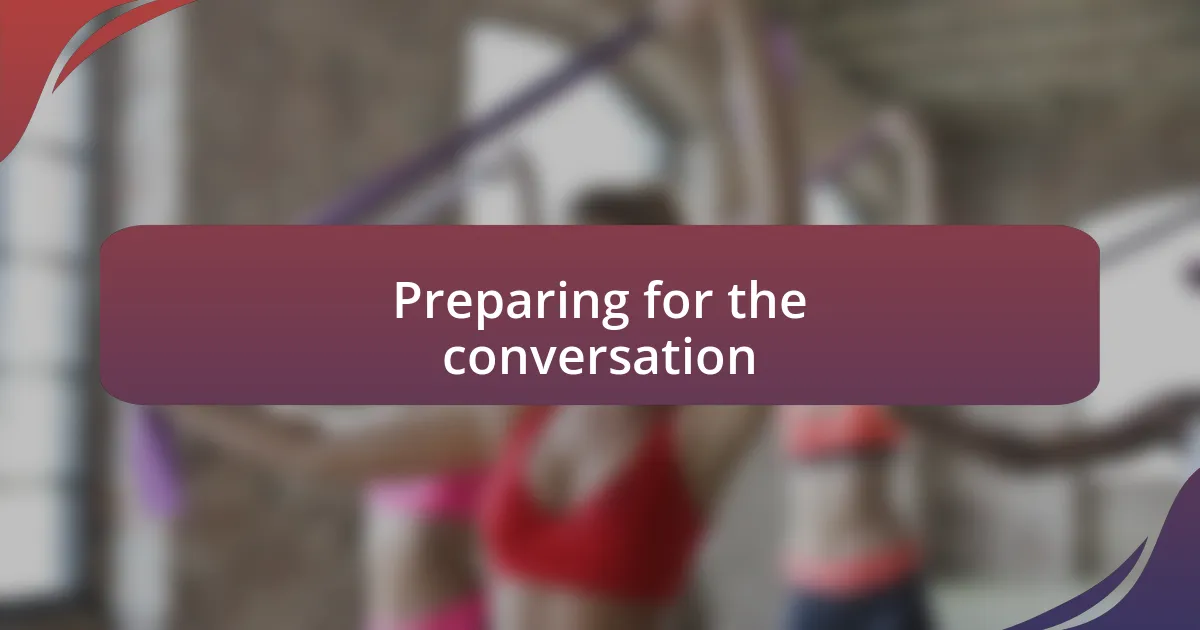
Preparing for the conversation
When preparing for the conversation about pads with family, it’s essential to approach the topic with an open and inviting attitude. I remember the first time I brought it up with my parents; their genuine curiosity about my experience made all the difference. I found that expressing my feelings and needs allowed for a more genuine discussion, easing any potential awkwardness.
Here are some helpful tips to ensure a smooth conversation:
- Choose a comfortable, private setting where everyone feels at ease.
- Start with your own experiences and emotions to create an open dialogue.
- Encourage questions and share facts about pads to educate and normalize the discussion.
- Be patient and allow time for everyone to process and respond.
- Remind family members that these conversations bring us closer and help break the stigma around menstrual health.
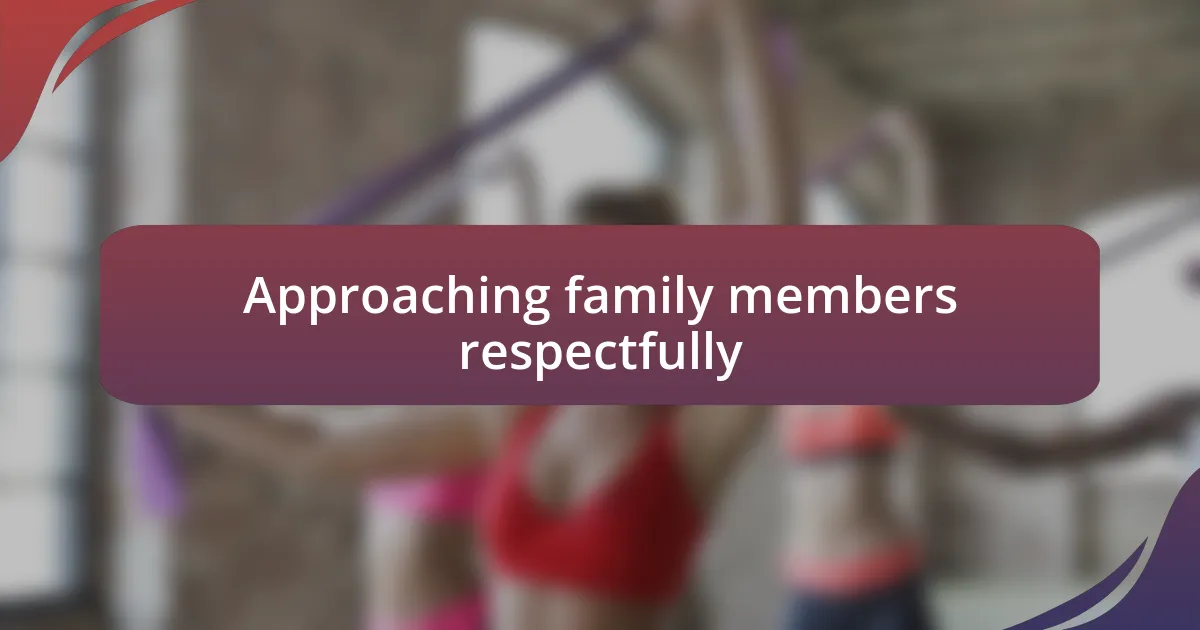
Approaching family members respectfully
It’s crucial to consider the feelings of family members when discussing pads. I recall one particularly memorable conversation with my sister, where I could see she felt a mix of curiosity and hesitation. Acknowledging her feelings helped create a supportive space, allowing us to share openly about our experiences. By actively listening and validating her concerns, I found that it encouraged her to join the conversation rather than feel defensive.
Respectful communication also involves choosing the right moment for a discussion. I once attempted to bring up the topic during a hectic family dinner, and it turned out to be a disaster. Everyone was distracted and unable to engage meaningfully. In contrast, when I waited for a quieter moment, I was able to convey my thoughts more clearly, fostering a much more productive dialogue. Remember, timing is everything when it comes to a sensitive subject like this.
Lastly, using inclusive language can greatly enhance the conversation’s tone. When I asked my family about their thoughts on pads, instead of making it just about me, I framed it as a family health issue. This shift not only respected their perspectives but also made them feel as though they had a stake in the conversation. It reinforced the idea that we are all in this together, contributing to a more enriching discussion.
| Tip | Description |
|---|---|
| Active Listening | Pay attention to their responses, showing that their feelings matter. |
| Choose the Right Time | Initiate the conversation when everyone is relaxed and open to discussion. |
| Use Inclusive Language | Frame the conversation to encompass everyone’s perspectives and experiences. |
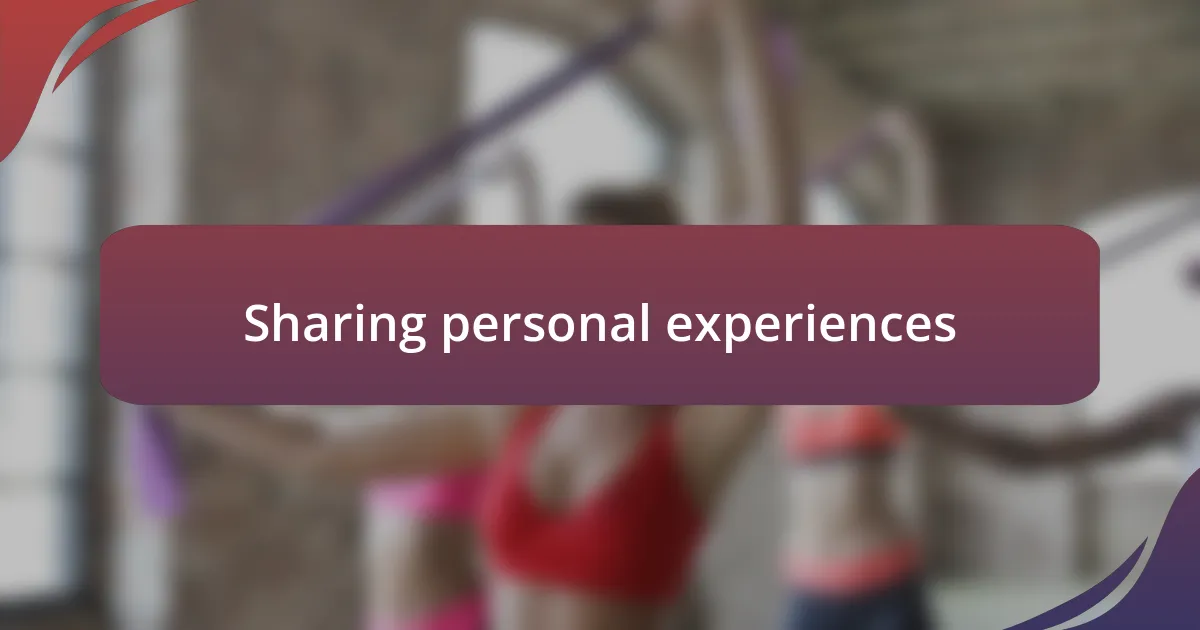
Sharing personal experiences
When I first shared my experiences with pads with my mom, I didn’t expect the wave of emotions it would stir in both of us. I remember hesitating, wondering if she would remember her own struggles with menstruation and perhaps feel embarrassed. But when I opened up about my challenges, her face softened as if I had unlocked a part of her past; it became a heartfelt exchange about our bodies and the importance of comfort.
Another time, I spoke with my cousin, who’s a few years younger than me. I began by recounting a funny incident where I accidentally mixed up my pads with a family size pack of wipes, leading to a very embarrassing moment at a sleepover. This light-hearted approach broke the ice, transforming what could have been an awkward discussion into a memorable bonding experience. Sharing those kinds of personal stories made it easier for her to relate and ultimately share her own experiences, fostering a deeper understanding among us.
There are moments when I reflect on how shared experiences can build bridges. Why do we often shy away from discussing topics that connect us? When I confessed my worries about whether I was using the right type of pad or if my choices were influenced by trends rather than comfort, my sister admitted she felt the same pressure. It’s amazing how a simple conversation about something so personal can reveal universal feelings, creating a supportive network that leaves us all feeling more connected and understood.
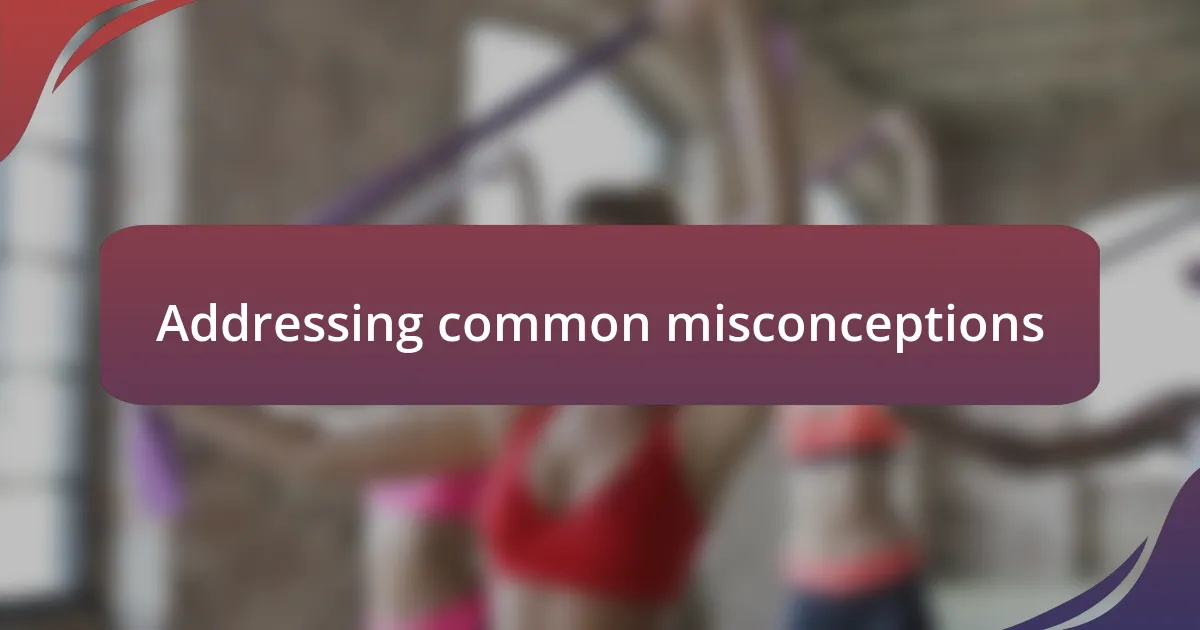
Addressing common misconceptions
When discussing pads with my family, I’ve often encountered the myth that pads are uncomfortable and visible under clothing. I remember the first time I tried a new brand; I was surprised at how soft and discreet they felt. Isn’t it interesting how misinformation can create barriers? Many people assume that all pads are bulky and unsightly, but the right choice can actually provide comfort and confidence.
Another misconception I’ve faced is the idea that discussing menstrual health is taboo or ‘too personal.’ I recall one dinner when my aunt casually mentioned how she’s been experimenting with different eco-friendly pad options. It was a revelation! I realized then that breaking the silence opens the door for valuable conversations about sustainability, health, and personal preference. Why is it that we hesitate to share such important aspects of our lives?
There’s also this pervasive belief that pads are the only choice for menstruation. I was once taken aback when a friend insisted on trying menstrual cups and suggested I should too. While I believe in being open to alternatives, my personal comfort with pads has its legitimacy. It’s crucial to recognize that everyone’s experience is unique. Shouldn’t our discussions reflect that diversity rather than push a single solution?
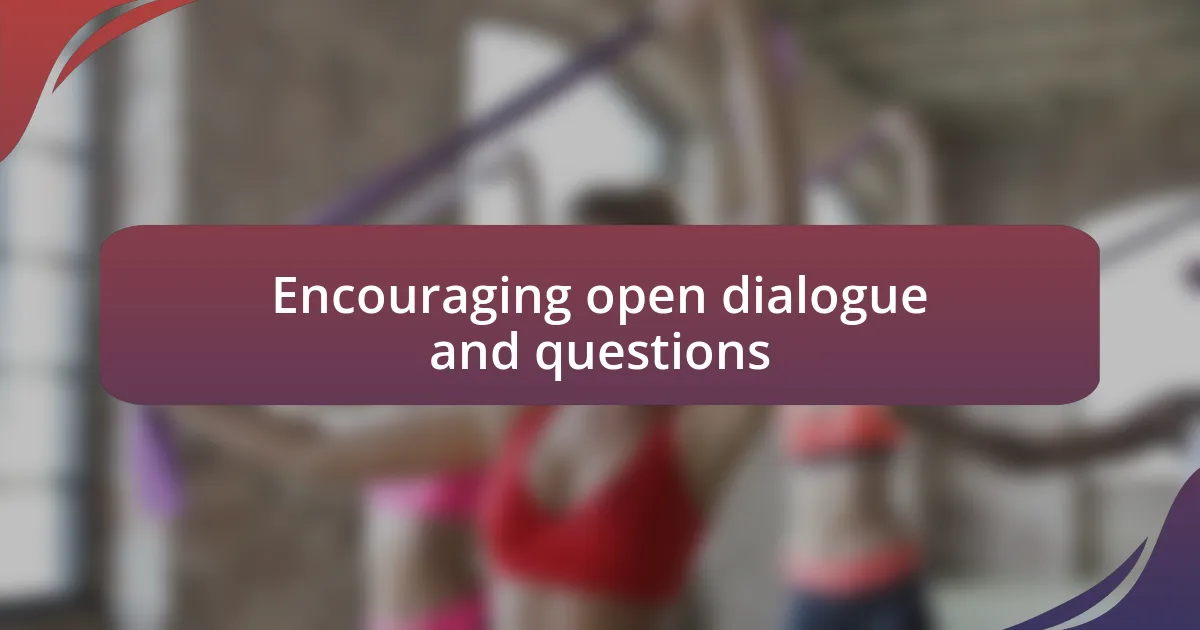
Encouraging open dialogue and questions
Encouraging open dialogue about pads with family really starts with creating a comfortable space for discussion. I remember a moment when I casually brought up my experience using pads during a family game night. The laughter and share-a-story vibe made it feel normal to chat about something that usually stays behind closed doors. Isn’t it liberating to transform what was once a hushed topic into something we can openly discuss?
It’s also vital to invite questions, no matter how awkward they might seem. I recall my younger cousin asking me if pads ever slip out of place, and rather than brushing it off, I appreciated her curiosity. It sparked a great conversation about how to choose the right fit and brand, and it felt rewarding knowing I could provide useful insights. Doesn’t it feel satisfying when we can turn an uncomfortable question into an educational moment?
Moreover, I believe that sharing our own adventures and mishaps around pads encourages others to speak up as well. On a particularly hectic day, I shared my story of being caught without supplies and how it taught me to always stay prepared. This light-hearted confession not only elicited chuckles but also prompted my sister to share her own “oops” moment. Isn’t that the essence of open dialogue—finding common ground and learning from one another’s experiences?
